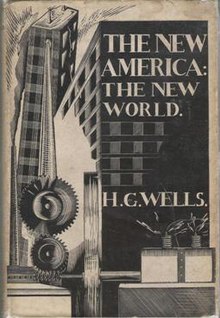The New America: The New World

First edition
|
|
| Author | H. G. Wells |
|---|---|
| Country | United Kingdom |
| Language | English |
| Genre | Articles |
| Publisher | The Cresset Press |
|
Publication date
|
1935 |
| Media type | Print (hardback) |
| Pages | 96 |
The New America: The New World is a collection of four articles by H.G. Wells written to examine the American scene, which Wells summed up in 1935 as "the spectacle of a great material civilization, halted, paralyzed." Wells's articles were published shortly after a 23-day visit to the United States in March 1935 that included a lunch with US President Franklin Delano Roosevelt and a talk with Senator Huey Long.
"Man is to-day a challenged animal," Wells wrote in the first article. "He has to respond, he has to respond successfully to the challenge, or he will be overwhelmed—like any other insufficiently adaptable animal." And in the 1930s Wells thought that America's response was the key to the species' response to three principal challenges: "the politico-war problem, the unemployment problem and the finance-monetary problem."
Resistance to solutions of these problems, Wells believed, were due principally to individuals' abiding tendency to be stubbornly attached to their own way of living, their own traditions. Wells detected this resistance as dominating both reactionary movements like fascism in Germany and revolutionary movements like Communism in the Soviet Union.
Wells was concerned at extent to which he observed what he called "the Raucous Voices" to be at the center of discussion of social problems in the United States. Among these he numbered Huey Long, Father Coughlin, and Francis Townsend. He was also dismayed at the conduct of what he called "the Inexplicit Men," mostly members of President Roosevelt's Brain Trust. These policymakers, like the New Deal itself and its leader, were in Wells's view not clear enough about their aims, thus increasing the likelihood that one of the "Raucous Voices" would prevail.
Wells was critical of many of the New Deal's economic policies, believing that the effort to impose restrictive controls on production was "biologically and socially unsound" because the release of surplus energy, rather than restraint, is a fundamental aspect of human nature. But he was relatively uncritical of Roosvelt, whom he called "an exceptionally subtle and exalted politician" and "a very strange and great man." Roosevelt's role, according to Wells, was "to sublimate, clarify and express the advancing thought of the community"; in 1935 he saw Roosevelt as principally in a phase of "listening and talking interestedly rather than decisively, of what he was hearing."
...
Wikipedia
